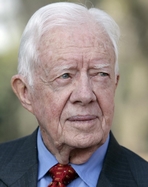European Russophobia and Europe’s Rejection of Peace: A Two-Century Failure
Europe has repeatedly rejected peace with Russia at moments when a negotiated settlement was available, and those rejections have proven profoundly self-defeating. Read more
 Jimmy Carter
Jimmy Carter
I HAVE known Bashar al-Assad, the president of Syria, since he was a college student in London, and have spent many hours negotiating with him since he has been in office. This has often been at the request of the United States government during those many times when our ambassadors have been withdrawn from Damascus because of diplomatic disputes.
Bashar and his father, Hafez, had a policy of not speaking to anyone at the American Embassy during those periods of estrangement, but they would talk to me. I noticed that Bashar never referred to a subordinate for advice or information. His most persistent characteristic was stubbornness; it was almost psychologically impossible for him to change his mind — and certainly not when under pressure.
Before the revolution began in March 2011, Syria set a good example of harmonious relations among its many different ethnic and religious groups, including Arabs, Kurds, Greeks, Armenians and Assyrians who were Christians, Jews, Sunnis, Alawites and Shiites. The Assad family had ruled the country since 1970, and was very proud of this relative harmony among these diverse groups.
When protesters in Syria demanded long overdue reforms in the political system, President Assad saw this as an illegal revolutionary effort to overthrow his “legitimate” regime and erroneously decided to stamp it out by using unnecessary force. Because of many complex reasons, he was supported by his military forces, most Christians, Jews, Shiite Muslims, Alawites and others who feared a takeover by radical Sunni Muslims. The prospect for his overthrow was remote.
The Carter Center had been deeply involved in Syria since the early 1980s, and we shared our insights with top officials in Washington, seeking to preserve an opportunity for a political solution to the rapidly growing conflict. Despite our persistent but confidential protests, the early American position was that the first step in resolving the dispute had to be the removal of Mr. Assad from office. Those who knew him saw this as a fruitless demand, but it has been maintained for more than four years. In effect, our prerequisite for peace efforts has been an impossibility.
The article’s full-text is available on the website of The New York Times